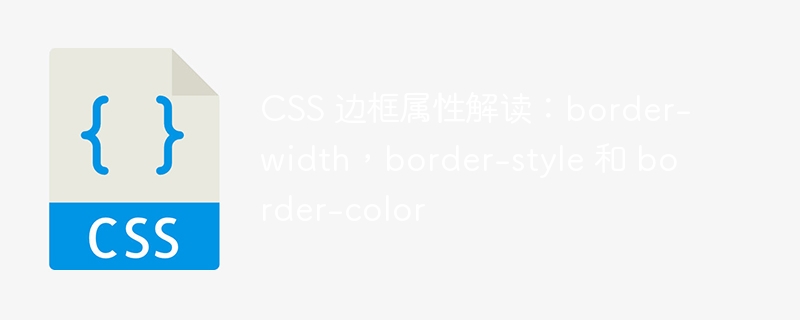Home >Web Front-end >CSS Tutorial >Interpretation of CSS border properties: border-width, border-style and border-color
Interpretation of CSS border properties: border-width, border-style and border-color
- 王林Original
- 2023-10-20 09:30:411775browse

Interpretation of CSS border properties: border-width, border-style and border-color, specific code examples are required
Introduction:
CSS (Cascading Style Sheet) It is a markup language used to describe the appearance of web pages and documents. In CSS, the border property is a useful tool for adding a border to an element to change its appearance and style. This article will explain in detail the three border properties in CSS: border-width (border width), border-style (border style) and border-color (border color), and provide specific code examples to illustrate their usage and effects.
- Border width (border-width):
The border-width attribute is used to define the thickness of the element border. You can use predefined keywords, or you can use specific pixel or percentage values. Here are some commonly used border width keywords:
- thin: thin border
- medium: medium border
- thick: thick border
Here are some sample codes:
.border-example {
border-width: 1px; /* 使用像素值定义边框宽度为1像素 */
}
.border-example2 {
border-width: medium; /* 使用关键字medium定义中等边框宽度 */
}- Border style (border-style):
The border-style attribute is used to define the style of the element border. You can use predefined keywords, such as: none (no border), solid (solid border), dotted (dotted border), dashed (dashed border), etc. Here is some sample code:
.border-example {
border-style: solid; /* 定义实线边框样式 */
}
.border-example2 {
border-style: dotted; /* 定义点线边框样式 */
}- Border color (border-color):
The border-color attribute is used to define the color of the element's border. You can use predefined color names or define colors using hexadecimal or RGB values. The following is some sample code:
.border-example {
border-color: red; /* 使用预定义颜色名称定义红色边框颜色 */
}
.border-example2 {
border-color: #00ff00; /* 使用十六进制值定义绿色边框颜色 */
} Comprehensive example:
The following is a sample code for comprehensive application of border attributes:
.border-example {
border-width: 2px; /* 定义边框宽度为2像素 */
border-style: dashed; /* 定义虚线边框样式 */
border-color: #ff0000; /* 定义红色边框颜色 */
}The above code will specify the class for The .border-example element adds a 2-pixel wide red dotted border.
Summary:
The border attribute is a commonly used style attribute in CSS, which can provide rich decorative effects for elements. Using the three properties border-width, border-style and border-color, we can easily define the width, style and color of the border. By properly applying these properties, we can easily change the appearance of an element to make it more beautiful and attractive.
Note: In actual applications, the border attribute can also be abbreviated by a line of code, for example: border: 2px dashed red;. This allows you to define the element's border style more concisely.
The above is the detailed content of Interpretation of CSS border properties: border-width, border-style and border-color. For more information, please follow other related articles on the PHP Chinese website!
Related articles
See more- How is the css outline attribute used? The difference between outline attributes and border attributes (example)
- How to use css border-width property
- What are the new border attributes in css3?
- What is the border attribute set by css
- CSS border style property optimization tips: border-style and border-color

